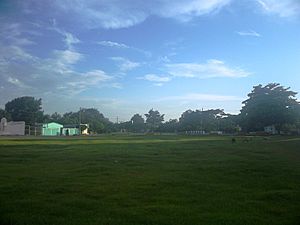Hacienda Kancabchén (Motul) facts for kids
Quick facts for kids
Hacienda Kancabchén
|
|
|---|---|

Principal park at Hacienda Kancabchén (Motul)
|
|
| Country | Mexico |
| Mexican States | Yucatán |
| Municipalities | Motul |
| Time zone | UTC−6 (CST) |
| • Summer (DST) | UTC−5 (CDT) |
| Postal code |
97440
|
| Area code | 991 |
Hacienda Kancabchén (also known as Kancabchén Rancho) is a historic estate located in the Motul Municipality of Yucatán, a state in southeastern Mexico. It was one of many large properties that became important during the 1800s because of the henequen plant. There are other places in Yucatán with a similar name, like Hacienda Kancabchén in Baca and Hacienda Kancabchén (Halachó).
Contents
Meaning of the Name
The name "Kancabchén" comes from the Mayan language. It means "the well of the red ground." This name likely describes the type of soil and the presence of a water well at the hacienda.
A Brief History of Haciendas
Haciendas were large estates or plantations, especially common in Mexico. Many of them, like Kancabchén, grew a plant called henequen. This plant was very important in Yucatán during the 1800s and early 1900s.
The Henequen Boom
The henequen plant, also known as sisal, is a type of agave. Its strong fibers were used to make ropes, twine, and other products. During the 19th century, there was a huge demand for these fibers around the world. This led to a "henequen boom" in Yucatán. Many haciendas grew rich by producing and exporting henequen.
Changes to the Haciendas
The way haciendas operated changed a lot in 1937. The Mexican government, under President Lázaro Cárdenas, made a big land reform. This reform turned many haciendas into collective farms called ejidos. An ejido is a piece of land used for farming by a community, where the land is owned by the government but used by individuals or groups.
This change meant that the large haciendas stopped being independent communities. The original landowners were only allowed to keep a small part of their land (about 150 hectares) for private use. The rest became part of the ejido system.
Population Changes at Kancabchén
Before 1937, the population figures for Hacienda Kancabchén showed how many people lived and worked on the farm itself. After the land reform, the numbers reflect the population of the wider community, as only the owner's family lived in the main hacienda buildings.
According to a census taken in 2005 by the INEGI, the community of Kancabchén had 360 residents. This included 181 men and 179 women.
The table below shows how the population of Kancabchén has changed over many years:
| Year | 1900 | 1910 | 1921 | 1930 | 1940 | 1950 | 1960 | 1970 | 1980 | 1990 | 1995 | 2000 | 2005 |
|---|---|---|---|---|---|---|---|---|---|---|---|---|---|
| Population | 30 | ? | 52 | 111 | 107 | 115 | 163 | 211 | 228 | 293 | 313 | 332 | 360 |
See also
 In Spanish: Kancabchén (Motul) para niños
In Spanish: Kancabchén (Motul) para niños


